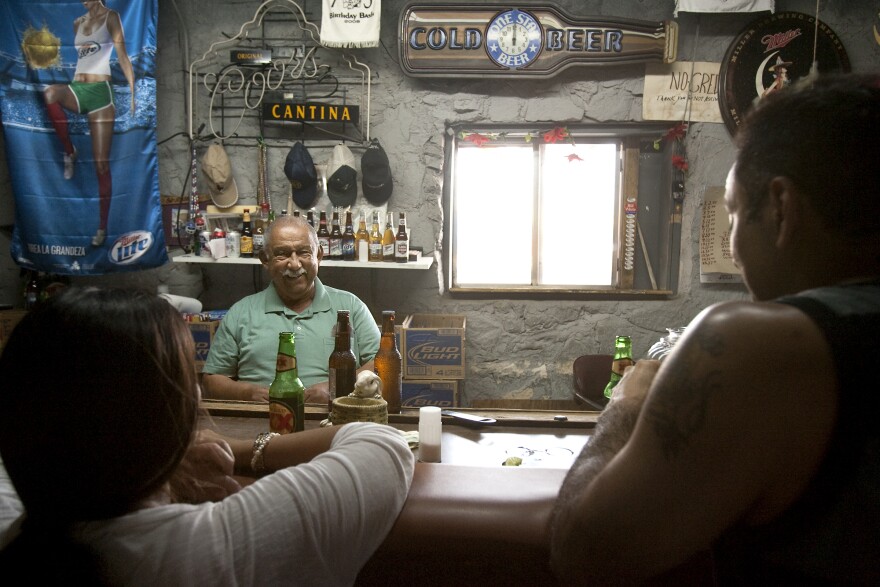As Latinos in Austin continue to be disproportionately impacted by the coronavirus, this month they were struck by another blow: the death of two titans of the community.
Rosalio "Rabbit" Duran, 87, and San Juan "Johnny" Limón, 69, leave behind a lasting legacy of service, dedication and love that stretches far beyond their East Austin roots.
'Rabbit' Duran
Duran helmed Rabbit’s Lounge in East Austin for more than 40 years. It was a haven of cold beer and Tejano music.
“There was never any drama, never any people getting loud. Everybody there was family, and everyone knew each other," José Velásquez, a fourth-generation East Austinite, says of the bar. "Even when new people came in, they were greeted like family.”
And as the godfather of Velásquez's older brother, Duran was family to him.

Velásquez says they truly bonded when he started Hermanos de East Austin, a community organization focused on the promotion and advancement of the people and culture of East Austin. Duran made the lounge available for community events like voter registration and school supply drives.
“He had a quiet strength. He’s the type of guy that walks into a room and everyone wants to hug him. But you also know that you didn’t mess around with Rabbit,” Velásquez says. “It was like showing up to your tio’s [uncle's] house, regardless of if he was your tio through blood or friendship. … There’s very few people that I ever met that were all heart like Rabbit.”
RELATED | Austin Funeral Home Helps Families Grieve COVID-19 Deaths – Even After Losing Founder To The Virus.
Rabbit's Lounge was also where Chicano politics emerged in Austin.
Paul Saldaña, another fourth-generation Austinite, says it became the base of the “Brown Machine": trailblazers like Richard Moya, John Treviño Jr. and Gus Garcia.
“What they all have in common is Rabbit,” Saldaña says. “Rabbit was the one who encouraged everybody. He would offer up his business and his bar – not only for people to plan their campaign strategies, but also to have their political fundraisers.”
The Limón, Duran, Saldaña and Velásquez families are just some of the Latinos who have called Austin home for at least a century, so ties run deep. Both Velásquez and Saldaña have fond memories of Duran and “Uncle Johnny,” as Limón was known to most everyone.
“[Rabbit] was very popular because he had a great sense of humor. Same thing with Johnny and Lois [Villaseñor], they had a natural magnetism about them that people were just sort of attracted to,” Saldaña says. “It was because it was always about the community … it was never about them. They were very humble, all of them.”
'Johnny' Limon
“Johnny was the best pieces of East Austin. He’s all heart. He navigated politics and family and everything with ease; it just seemed seamless for him,” Velásquez says. “He didn’t ruffle feathers … and he navigated some very controversial issues like gentrification, displacement, education. Just about any social ill, Johnny was there.”
Lonnie Limón says he knew just how busy his uncle was because he was always headed off to a meeting.
“I don't think any of us could have understood the depth of just how many organizations or causes he was behind over the course of many, many years,” Limón says. “It was tireless and selfless.”

Johnny Limón was said to be a man who lost himself in service, whether it be delivering food for Meals on Wheels, protecting the environment that Austin Latinos grew up in, or advocating for the promotion of Tejano music in the “live music capital of the world."
He would push back if someone said only older people listened to Tejano music or it was unique to San Antonio or the Rio Grande Valley.
He'd say, "but we’re the live music capital of the world, so let’s promote the heritage and the history of [Tejano music] and let people learn about it," his nephew says.
Saldaña remembers Limón's work with PODER, the People Organized in Defense of Earth and Her Resources. He was one of the leaders who fought to close an old recycling plant by his home on the street that now bears his family name.
“The neighborhoods for decades were subjected to all the garbage and recycling trucks driving through the neighborhoods, the smells,” Saldaña said. “They had rat infestations, cockroach infestations, you name it.”
In 1996, the plant on Bolm Road caught on fire and much of the debris floated over into historically Latino neighborhoods, landing on roofs. It permanently closed in 2002.
Big Shoes To Fill
Duran and Limón weren't the only pillars of Austin's Latino community who passed away this year. Manuel Donley, Ramón Galindo, Lois Villaseñor: They all left big marks – and big holes.
Saldaña says it's incumbent on younger Latinos to learn the stories of people responsible for the progress and prosperity of Austin.
“We cannot let the legacy and the work that was done by Mrs. Villasenor, Johnny Limón, Rabbit Duran, our parents and great-grandparents and others who’ve come before us … we cannot let their hard work end now,” he says.
Lonnie Limón says his uncle should be remembered for one thing.
“Kindness,” he says. “He was a kind person. He could be forceful with his opinion, especially when he was speaking about a topic he was passionate about – be it Tejano music or affordable housing – but he was always kind.”
Velasquez had one word for both Duran and Limón: Corazón (heart).
“They really don’t make 'em like that anymore,” he says. “I hope that we take the best of everything that they taught us and are able to create a platform for the generation coming up behind us.”
Got a tip? Email Jerry Quijano at jerry@kut.org. Follow him on Twitter @jerryquijano.
If you found the reporting above valuable, please consider making a donation to support it. Your gift pays for everything you find on KUT.org. Thanks for donating today.



